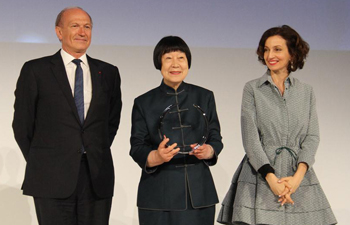GUANGZHOU, March 25 (Xinhua) -- Ma Jieyao, the owner of a small stall in a garment wholesale market in the city of Guangzhou, south China's Guangdong Province, didn't speak any English two months ago.
But now, after a few lessons in "Shop English," she is no longer afraid to face foreign buyers.
This particular variety of the English language course is all about price inquiries, bargaining, payment and delivery terms. The speakers pay little attention to grammar or pronunciation -- it's a language of getting things done.
"Now when I want to greet buyers, I say, 'Please have a look,' and I know how to show them new things. I can say 'last price' and numbers," said Ma. "And I just learned 'delivery' and 'warehouse' today."
The evolution of language always reflects changes in the economic and cultural landscape. With accelerating globalization, foreign languages are becoming more accessible and approachable.
Simplified forms of business language like Shop English course are increasingly popular among traders in Guangzhou, China's southern trade hub and home to about 1,000 wholesale markets.
Hundreds of thousands of people are looking for business opportunities there.
"If I can talk to a foreigner directly, both of us will be happy," Xia Mingyue, another shop owner, told Xinhua. Xia started taking Shop English classes two years ago. "It will save time and money. Hiring an interpreter could be expensive. Why not spend that money making the quality better or the packaging prettier?"
Xia doesn't watch Hollywood movies or listen to English songs, but she can sell her clothes to Eastern Europe or Latin America.
Xiao Wuwei, founder of an English training school, said that more than 2,000 people took its "Shop English" course in 2017. His oldest student was a 73-year-old man who sells glasses.
Xiao's school introduced a program called "Cross-border E-commerce English" two years ago to help stall keepers do business with foreigners online.
Liu Guodong is the teacher who designed the new program. He is also a part-time businessman himself.
"When you do business at your stall, you're actually waiting for the buyers to come," Liu said. "But things are different online. You have to promote your goods, write attractive product descriptions, and deal with inquiries both before and after sales, so there are many things to learn."
Xiao is planning to optimize the school's curriculum and develop programs on "Logistics English," "Design English," and "Intellectual Property Rights English."
At the same time, he has launched "Shop Spanish," "Shop Arabic" and "Shop Russian" for stall keepers, as well as "Shop Chinese" and even "Shop Cantonese" for foreign buyers, as the Belt and Road Initiative proposed by China has drawn more people and capital.
Ding Hongchao, associate professor at Guangzhou Panyu Polytechnic, pointed out that cross-border e-commerce will soon become the major form of international trade, and small stall keepers must adapt themselves to the trend.
"There are so many markets, so many stalls and so many traders in Guangzhou and in China, and it's a matter of life and death. If learning the language can help them get orders online, it'll also help the whole transition process for China's foreign trade," said Ding.

















